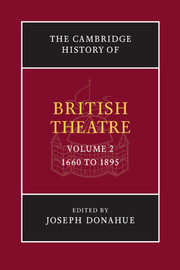Book contents
- Frontmatter
- Part I 1660 to 1800
- 1 Introduction: the theatre from 1660 to 1800
- 2 Theatres and repertory
- 3 Theatre and the female presence
- 4 Theatre, politics and morality
- 5 Theatre companies and regulation
- 6 The Beggar’s Opera A case study
- 7 Garrick at Drury Lane, 1747–1776
- 8 Theatre outside London, 1660–1775
- 9 1776 A critical year in perspective
- 10 The theatrical revolution, 1776–1843
- Part II 1800 to 1895
- Bibliography
- Index
- References
2 - Theatres and repertory
from Part I - 1660 to 1800
Published online by Cambridge University Press: 28 March 2008
- Frontmatter
- Part I 1660 to 1800
- 1 Introduction: the theatre from 1660 to 1800
- 2 Theatres and repertory
- 3 Theatre and the female presence
- 4 Theatre, politics and morality
- 5 Theatre companies and regulation
- 6 The Beggar’s Opera A case study
- 7 Garrick at Drury Lane, 1747–1776
- 8 Theatre outside London, 1660–1775
- 9 1776 A critical year in perspective
- 10 The theatrical revolution, 1776–1843
- Part II 1800 to 1895
- Bibliography
- Index
- References
Summary
An historian of English drama in the period 1660–1776 needs to start by admitting that sequential analysis of new plays by themselves can only yield a very partial picture. We may legitimately characterize the new plays and trace generic changes, but we must reckon with the fact that these plays were the product of a theatre system that emphasized the appeal of favourite actors and relied heavily on stock repertory. New plays occupied few nights in most seasons and they do not really have a separate history of their own.
The period we are considering is tidily bounded at the outset by the restoration of the theatres by Charles II when he returned from exile in 1660. No satisfying terminus ad quem exists: there is no sharp break in the drama between the revival of playwriting in the 1750s (following the lull caused by the Licensing Act of 1737) and the 1820s, when ‘illegitimate’ competitors put the patent theatres on the skids. The year 1776 makes a convenient stopping point: Garrick retired from acting and management at Drury Lane that year (selling out to a partnership headed by Richard Brinsley Sheridan), and Thomas Harris was just beginning his long reign as manager at Covent Garden. In drama, though there is no abrupt change, the social comedies and fancy musicals (‘English operas’) of the eighties and nineties reflect norms significantly different from those of the sixties and seventies.
The future of English drama was profoundly affected by the terms of its relegitimation in 1660. Four points are fundamental. These are the duopoly created by the patent grants of 1662 and 1663, the introduction of actresses on the public stage, the construction of changeable scenery theatres, and the radically unequal division of rights to old plays between the two companies that jointly shared a monopoly on dramatic entertainment in London.
- Type
- Chapter
- Information
- The Cambridge History of British Theatre , pp. 53 - 70Publisher: Cambridge University PressPrint publication year: 2004



